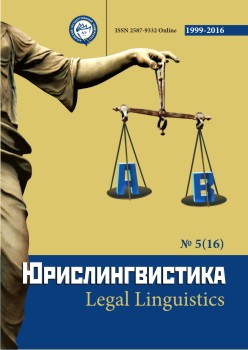LEGAL TERMINOLOGY USED IN HEREDITARY LEGISLATION
Abstract
This article discusses the usage of inheritance law terminology that does not correspond to the factual background. It is illustrated by sometimes misused names of two important subjects of relations that fall under the regulations of inheritance law: testator and inheritor, and surviving spouse. Legislator believes that one can carry out unlawful actions against the life and health of the deceased, that is the testator, they believe that the deliberate unlawful actions may be carried out against the inheritor that does not exist yet because they only appear in case of potential testator’s death. A person carrying out unlawful actions against life and health of the potential testator and other potential inheritors cannot lose the right to inherit because they technically do not yet have this right. According to the above mentioned, the right of the potential inheritor to inherit cannot be restored by the will of the potential testator. The erroneous terminology enshrined in the law leads to the misinterpretations of some provisions of law by the Judicial Authorities. Thus, the Constitutional Court of the Russian Federation believes that the testator, that is deceased, has the right to devise and bequeath and the right to inherit. The Supreme Court of the Russian Federation also uses the above mentioned erroneous terminology. This shows not only legislator’s misconceptions but also errors in the doctrine. Specialists in civil law ignore terminology in the numerous dissertations, monographs, books, comments and articles. Alike the law they do not distinguish between testator and potential testator, inheritor and potential inheritor, the legal capacity to inherit and the right to inherit. Some of the recent works say that the legal capacity to inherit appears together with the right to inherit. Despite the letter of law there is also an opinion that the inheritor appears after accepting the inheritance not at the opening of the inheritance. Thus, we can conclude that a wrongly expressed legislator’s idea leads to mistakes in law enforcement and doctrine.
Downloads
Metrics
References
Алексеев С.С. Проблемы теории права. В 2 т. Свердловск, 1973. Т. 2. С. 157.
Керимов Д.А. Законодательная техника. М., 2000. С. 55.
Ожегов С.И. Словарь русского языка. /Под ред. чл.-корр. АН СССР Н.Ю. Шведовой. – 18 изд., стереотип. М., Рус. яз. 1987. С. 62.
REFERENSE
Alekseev S.S. Issues of Legal Theory [Problemy teorii prava]. In two parts, 1973. Part 2. Page 157.
Kerimov D.A. Legislative technique [Zakonodatelnaya tekhnika]. M., 2000. Page 55.
Ozhegov S.I. Dictionary of the Russian language [Slovar russkogo yazyka]. Under Rev. of the Science Academy member - 18 edition. M., Russian language. 1987. Page. 62.
Copyright (c) 2017 Юрислингвистика

This work is licensed under a Creative Commons Attribution 4.0 International License.
The authors, which are published in this journal, agree to the following conditions:
1. Authors retain the copyright to the work and transfer to the journal the right of the first publication along with the work, at the same time licensing it under the terms of the Creative Commons Attribution License, which allows others to distribute this work with the obligatory indication of the authorship of this work and a link to the original publication in this journal .
2. The authors retain the right to enter into separate, additional contractual agreements for the non-exclusive distribution of the version of the work published by this journal (for example, to place it in the university depository or to publish it in a book), with reference to the original publication in this journal.
3. Authors are allowed to post their work on the Internet (for example, in a university repository or on their personal website) before and during the review process of this journal, as this may lead to a productive discussion, as well as more links to this published work (See The Effect of Open Access).











